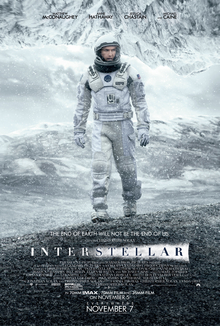In the near future Planet Earth
is in disarray, the food stocks are running low, natural resources are all but
gone and constant dust storms merely add to the environmental problems on
Earth. NASA stages a plan to find a planet that is habitable for the human race
and Matthew Mcconaughey's Cooper is just the man to lead this expedition.
Cooper accepts the mission leaving behind his son (Timothée Chalamet), father
in law (John Lithgow) and daughter (Mackenzie Foy).The crew investigate a
number of signals transmitted by previous expeditions to analyse the
possibility of the planets providing ample conditions for life.
Christopher Nolan has established
himself as Hollywood's most bankable directors, his films have a combined gross
of over $2,000,000,000 (The Dark Knight
Rises grossed over a billion on its own) thus Paramount saw fit to allow
Christopher Nolan to direct his own personal film, with minimal interference,
and a massive budget. Working with his brother, Jonathan, Christopher Nolan's
drafted a script packed with ideas on the Earth's environmental problems, the
possibility of human colonisation of space and the importance of space exploration.
Nolan feels that the 'human desire for knowledge and exploration is an absolute
good, and we need to follow that instinct' as space exploration will help
advance the human race.
Nolan's film is certainly a
powerful, brave epic more in the mould of 2001:
A Space Odyssey than his recent blockbusters. The majestic outer space
sequences and visuals are inspired by Kubrick's masterpiece, but the films that
Nolan's Interstellar are more
reminiscent of are Robert Zemeckis' Contact
(also starring Matthew Mcconaughey) and Douglas Trumbull's (who worked on 2001's special effects) Silent Running. Both Contact and Nolan's Interstellar heavily feature a young girl crying out for her father
to return from beyond the stars. The relationship between father and daughter
becomes the film's focal point in both Contact
and Interstellar.
Despite the film's tremendous
scope, Nolan manages to bring some heart to proceedings. Whilst some characters
are left underdeveloped, the relationship between father and daughter is the
heart of the film and is deeply moving. The relationship between the pair is
beautifully written and the performances by Matthew Mcconaughey and Mackenzie
Foy are extremely effective. Matthew Mcconaughey is undoubtedly the star
performer as he superbly portrays his characters' guilt at leaving his daughter
behind. The fact that time differs for those on the exploration trek and those
on Earth also adds emotional weight to the film (the scene in which Cooper sees
his children and grandchildren grow is heart breaking.
Interstellar is perhaps Nolan's best directed film, he allows the
pace to be slow, measured and ponderous, allowing his ideas to develop rather than letting it hurtle into the messy
black hole of his ideas. Nolan's direction is terrific, but he has a talented
crew of people working for him all combining to make an astonishingly well made
film. Nathan Crowley's production design, influenced by 2001, is superb, Lee Smith's editing is excellent (the juxtaposition
in the scene where Cooper is leaving his daughter and the countdown to liftoff
is an incredibly simple but stunning piece of filmmaking), Hoyten van Hoytema's
cinematography is outstanding and Hans Zimmer's score is emotional and haunting
and evocative as the film itself. Interstellar
is also visually memorable, the ice world and stunning wall of water are highlights
in a film of a gigantic scale.
In a world of remakes and sequels
Intersellers' ambitions and scope are
impressive, but the film is hampered by some poor dialogue and philosophical
waffle. For example, the scene in which Anne Hathaway's Amelia's says that love
travels across all dimensions is complete babble. Some have mentioned the exposition
where astronomers explain what black holes and wormholes are to other
astronomers as a flaw, but how inaccessible to they want the film to be? The
film also loses it way in a somewhat predictable final act.
Visually stunning, brave and
ambitious Christopher Nolan's Science Fiction epic is a flawed but memorable
experience if seen on the big screen.
4.5/5




I agree with literally everything you said (including the grade). Well, I wouldn't call the final act necessarilly predictable, but it was too Hollywood.
ReplyDelete